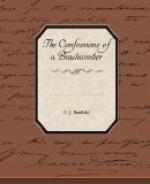September is the prime month of the year in tropical Queensland. Many of the trees are then in blossom and most of the orchids. Nocturnal showers occur fairly regularly in normal seasons, and every sort of vegetable is rampant with the lust of life. It was September when our isolation began. And what a plenteous realisation it all was that the artificial emotions of the town had been, haply, abandoned! The blood tingled with keen appreciation of the crispness, the cleanliness of the air. We had won disregard of all the bother and contradictions, the vanities and absurdities of the toilful, wayward, human world, and had acquired a glorious sense of irresponsibleness and independence.
This—this was our life we were beginning to live—our very own life; not life hampered and restricted by the wills, wishes and whims of others; unencumbered by the domineering wisdom, unembarrassed by the formal courtesies of the crowd.
September and the gin-gee, the quaint, grey-barked, soft-wooded tree with broad, rough, sage-green leaves, and florets massed in clumps to resemble sunflowers, was in all its pride, attracting relays of honey-imbibing birds during the day, and at night dozens of squeaking flying-foxes. Within a few yards of high-water stands a flame-tree (ERYTHRINA INDICA) the “bingum” of the blacks. Devoid of leaves in this leafy month, the bingum arrays itself in a robe of royal red. All birds and manner of birds, and butterflies and bees and beetles, which have regard for colour and sweetness come hither to feast. Sulphur-crested cockatoos sail down upon the red raiment of the tree, and tear from it shreds until all the grass is ruddy with refuse, and their snowy breasts stained as though their feast was of blood instead of colourless nectar. For many days here is a scene of a perpetual banquet—a noisy, cheerful, frolicsome revel. Cockatoos scream with excitement and gladness; honey-eaters whistle and call; drongos chatter and scold the rest of the banqueters; the tiny sun-bird twitters feeble protests; bees and beetles maintain a murmurous soothful sound, a drowsy blending of hum and buzz from the rising of the sun until the going down thereof.
The dark compactness of the jungle, the steadfast but disorderly array of the forest, the blotches of verdant grass, the fringe of yellow-flowered hibiscus and the sapful native cabbage, give way in turn to the greys and yellows of the sand in alternate bands. The slowly-heaving sea trailing the narrowest flounce of lace on the beach, the dainty form of Purtaboi, and the varying tones of great Australia beyond combine to complete the scene, and to confirm the thought that here is the ideal spot, the freest spot, the spot where dreams may harden into realities, where unvexed peace may smile.
There is naught to remind of the foetidness, the blare and glare of the streets. None of
“The weariness, the
fever and the fret,
There, where men sit and hear
each other groan.”




